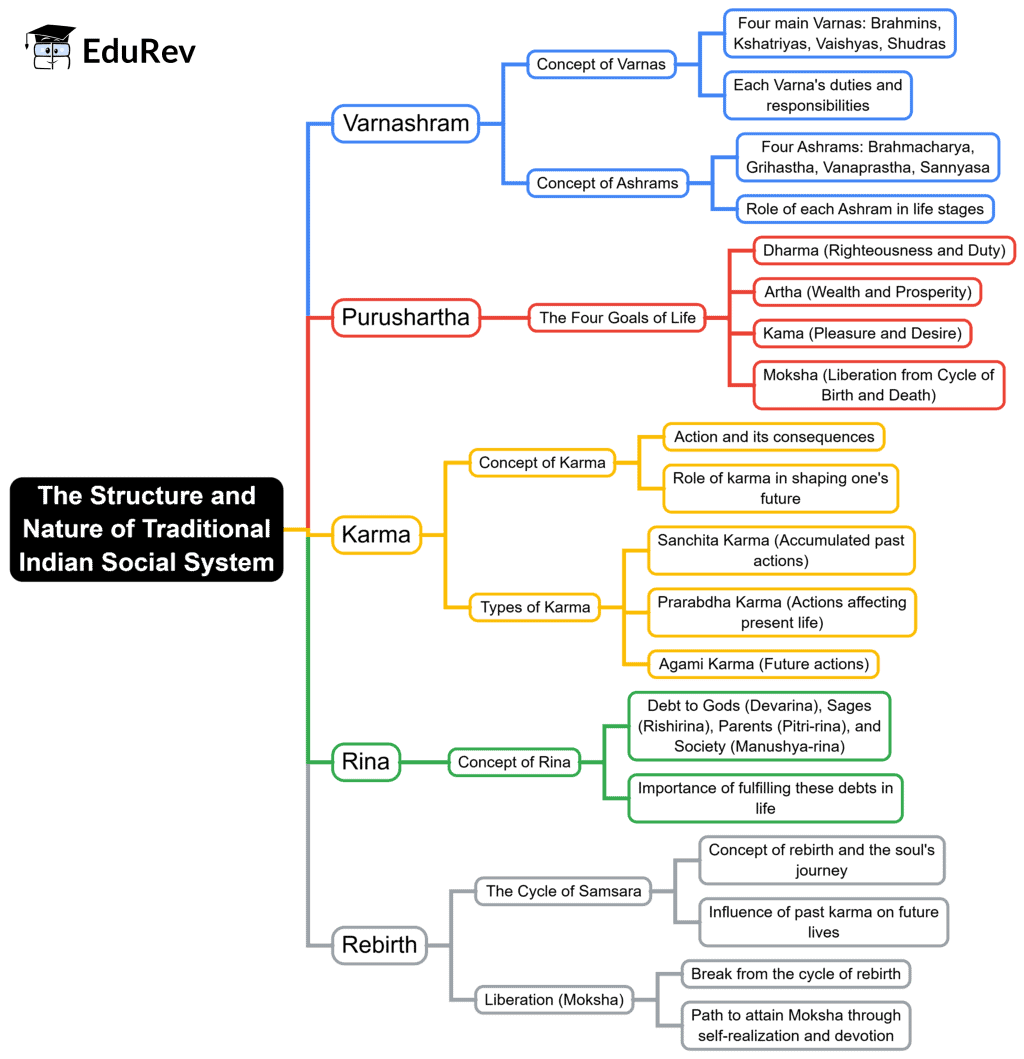UPSC Exam > UPSC Notes > Anthropology Optional for UPSC > Mind Map: Structure and Nature of Traditional Indian Social System
Mind Map: Structure and Nature of Traditional Indian Social System | Anthropology Optional for UPSC PDF Download

The document Mind Map: Structure and Nature of Traditional Indian Social System | Anthropology Optional for UPSC is a part of the UPSC Course Anthropology Optional for UPSC.
All you need of UPSC at this link: UPSC
|
108 videos|273 docs
|
FAQs on Mind Map: Structure and Nature of Traditional Indian Social System - Anthropology Optional for UPSC
| 1. What are the key characteristics of the traditional Indian social system? |  |
Ans. The traditional Indian social system is characterized by its hierarchical structure, which is often represented through the caste system. It is marked by social stratification, where different groups have specific roles and responsibilities. Family and kinship play a central role in social organization, and there is a strong emphasis on community and collective identity. Additionally, traditions, rituals, and customs are integral to social interactions, influencing various aspects of life including marriage, occupation, and social status.
| 2. How does the caste system function in the traditional Indian social system? |  |
Ans. The caste system in traditional Indian society is a social stratification system that categorizes individuals into different groups based on their birth. Each caste is associated with specific occupations, social status, and cultural practices. The system is typically divided into four main varnas: Brahmins (priests and scholars), Kshatriyas (warriors and rulers), Vaishyas (traders and agriculturists), and Shudras (laborers and service providers). While the caste system has been challenged and reformed, its historical significance continues to influence social dynamics in India today.
| 3. What role do family and kinship play in the traditional Indian social system? |  |
Ans. Family and kinship are fundamental components of the traditional Indian social system. They provide a framework for social support, identity, and continuity of cultural values. Extended families are common, and relationships are often defined by complex networks of kinship. Decisions regarding marriage, education, and even career choices are often made within the family context, reflecting the importance of familial ties in individual lives. The system fosters a sense of belonging and loyalty, reinforcing social cohesion.
| 4. How has modernization affected the traditional Indian social system? |  |
Ans. Modernization has significantly impacted the traditional Indian social system by introducing changes in economic structures, urbanization, and exposure to global ideas. The caste system has weakened in many urban areas, as economic opportunities have become more merit-based rather than caste-based. Education and employment in diverse fields have encouraged social mobility. However, the transition has also led to tensions as traditional values clash with modern practices, causing a re-evaluation of identity and social norms.
| 5. What are the implications of the traditional Indian social system on contemporary Indian society? |  |
Ans. The implications of the traditional Indian social system on contemporary society are multifaceted. While some vestiges of the caste system persist, contemporary India is witnessing a blend of traditional values and modern influences. Issues such as caste discrimination, social inequality, and gender roles continue to be relevant, prompting ongoing social reform and legal interventions. Additionally, the importance of community and familial ties remains strong, influencing social behavior, political affiliations, and cultural practices in modern India.
Related Searches




















